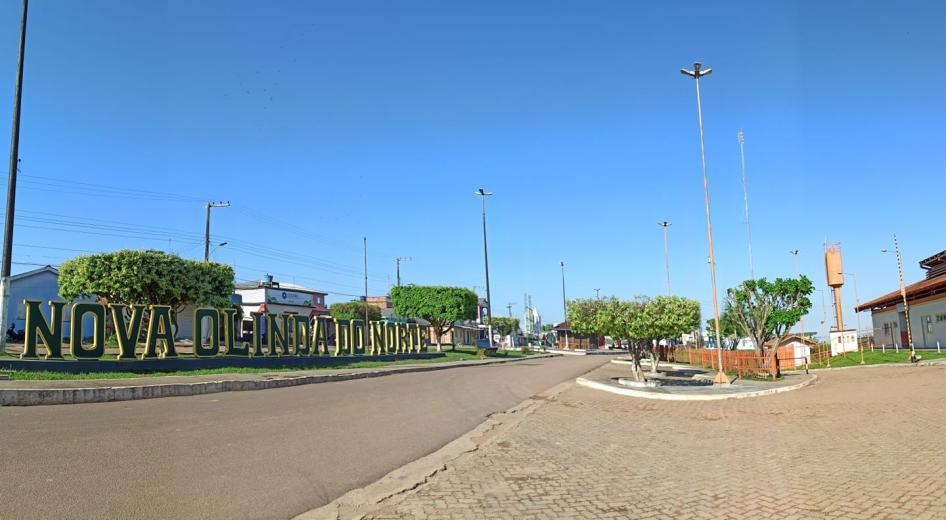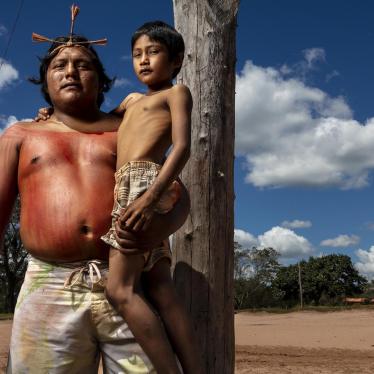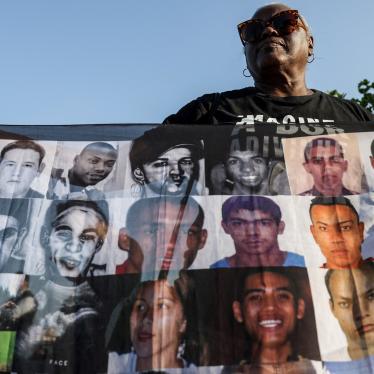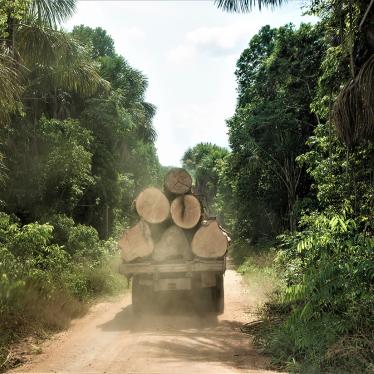(São Paulo, August 8, 2020) – Brazil’s federal police should immediately send officers to protect Indigenous people and local residents, and collect any evidence of abuses allegedly committed during an ongoing state police operation in the Amazon region, Human Rights Watch said today. A federal judge ordered the deployment of federal police on August 7, 2020.
Federal prosecutors have received reports of alleged killings of Indigenous people by Amazonas state military police in the context of the policing operation in Nova Olinda do Norte, in Brazil’s Amazon region, which began on August 4. The prosecutors have also received credible evidence, which Human Rights Watch has also seen, of other abuses during the operation, including entering homes without a warrant, death threats, and a case of torture.
“Federal police should deploy officers immediately to investigate the serious allegations of abuses in the Amazon region,” said Maria Laura Canineu, Brazil director at Human Rights Watch. “It is critically important to take prompt and effective action to protect local residents from further human rights violations and from any reprisals from state police for speaking out about the abuse.”
Munduruku Indigenous people reported to federal prosecutors that two brothers from Coatá-Laranjal Indigenous Territory disappeared on August 5 when they were traveling by canoe along the Abacaxis river to Nova Olinda do Norte, according to documentation and recorded audio messages reviewed by Human Rights Watch. Indigenous leaders said that the police shot at the brothers from a boat, unprovoked. The body of one of the brothers was found floating in the river on August 6.
Federal prosecutors said they have received unconfirmed reports that five other people had been killed by state police in Nova Olinda do Norte. The Amazonas state secretariat has confirmed only one death, of a man who allegedly opened fire against the officers.
On August 7, a judge ordered the federal government to send the federal police to the region to protect Indigenous people and local residents and ordered the government of Amazonas state to stop impeding their movement along the Abacaxis river.
The events that led to the state police operation started on July 23, when two private fishing boats docked along the Abacaxis River in Nova Olinda do Norte, Amazonas state. One of the boats, called Arafat, carried the Amazonas state secretary for social development, Saulo Moyses Rezende da Costa.
A local resident who works with state officials to enforce fishing regulations boarded the Arafat and determined that it lacked the required permit to fish in the area, a federal prosecutor and the resident told Human Rights Watch. The area is reserved for the use of two “Agro-Extractivist Settlement Projects,” created by the federal land-reform agency (INCRA), through which local residents and the Maraguá Indigenous people have collective use of the land and can carry out only environmentally sustainable economic activities.
Yet the boat continued on the river toward the Terra Preta community. There, someone shot at the boat, causing a minor injury to Costa. The authorities believe that drug dealers operating out of that community shot at the state secretary.
On August 3, the Arafat and two other private boats returned to the Abacaxis river, carrying about 10 undercover state military police officers, to find who shot at Costa, federal prosecutors said. At Terra Preta there was a shootout and, according to the state secretary of public security, two officers were killed and two others injured.
In response, Amazonas state sent 50 military police officers to the area, including colonel Ayrton Norte, their commander.
A local community leader told Human Rights Watch and federal prosecutors that on August 4, military police took him to a hotel in Nova Olinda, where two officers hit him in the stomach and face for about 30 minutes. About 10 officers were allegedly present. They kept ordering the community leader to provide information about those responsible for the death of the two officers, but he said he did not know anything about it.
Then they took him to the Arafat, which was moored in Nova Olinda, he said. A federal prosecutor told Human Rights Watch that the officers may have been afraid the noise and the man’s cries would attract attention at the hotel. Along the way, the community leader asked for help from the hotel receptionist and a motorcycle taxi, who alerted his relatives. “They would have killed me if I had not warned the motorcycle taxi,” the community leader told Human Rights Watch.
The officers continued the beating on the boat and also put a plastic bag over the man’s head several times until he was about to faint, he recalled. One of the men pulled a folding knife and threatened to cut his genitals, the community leader said.
After an hour, officers put him in a car, continued to beat him inside, and finally let him go with a warning: “If you don’t tell anyone, you’ll live. If you talk, you’ll die.”
He decided to report what had happened to the Amazonas civil police. But the civil police refused to register the complaint. He said he believes they did not want to investigate the military police. Then the community leader reported what had happened to him to a federal prosecutor, who filed a habeas corpus petition for federal protection for him. A judge has not ruled on the issue.
The judge sent the documentation to Amazonas state authorities. The community leader believes that making his case public, since civil police and state authorities already know about his allegations, can offer him some protection.
Federal programs to protect human rights defenders and to assist victims and threatened witnesses should immediately provide protection to the community leader, Human Rights Watch said.
Federal prosecutors and Human Rights Watch also received statements from residents who said since August 4, military police have entered their homes without warrants, pointed weapons at them and threated to kill them. The police also allegedly stole food and hundreds of liters of gas for their boats and confiscated their cell phones that had been used to record abuses. Police have allegedly restricted transit along the Abacaxis river, preventing the transport of food and other supplies to communities along the river.
“The killing and wounding of police officers should be fully investigated, but that investigation should never take the form of terrorizing local communities and violating their rights,” Canineu said. “Military police should uphold the law, not violate it, and if they do, they should be held fully to account.”







